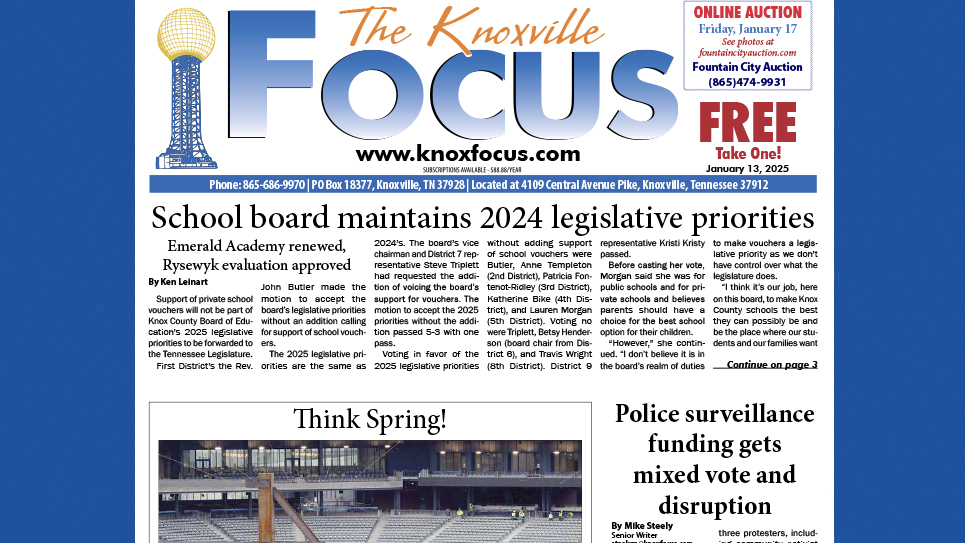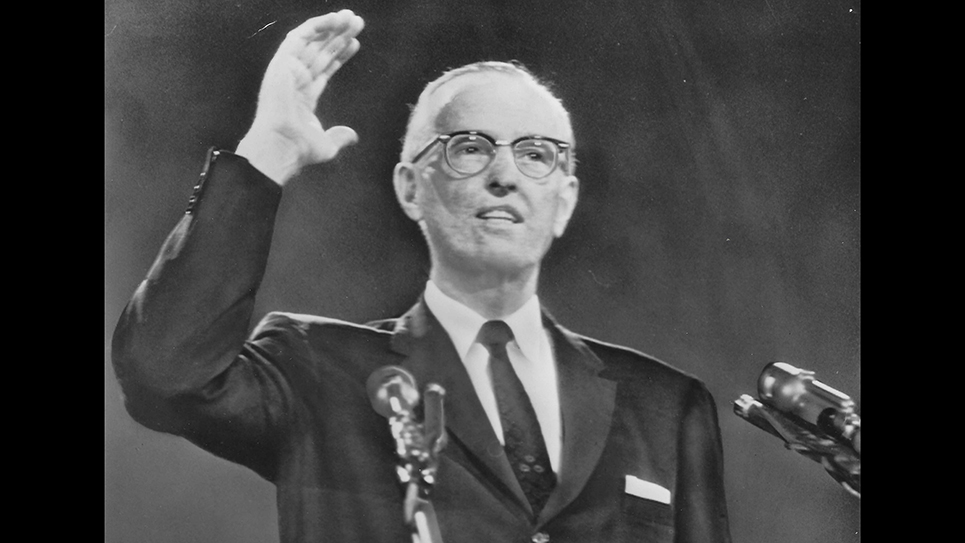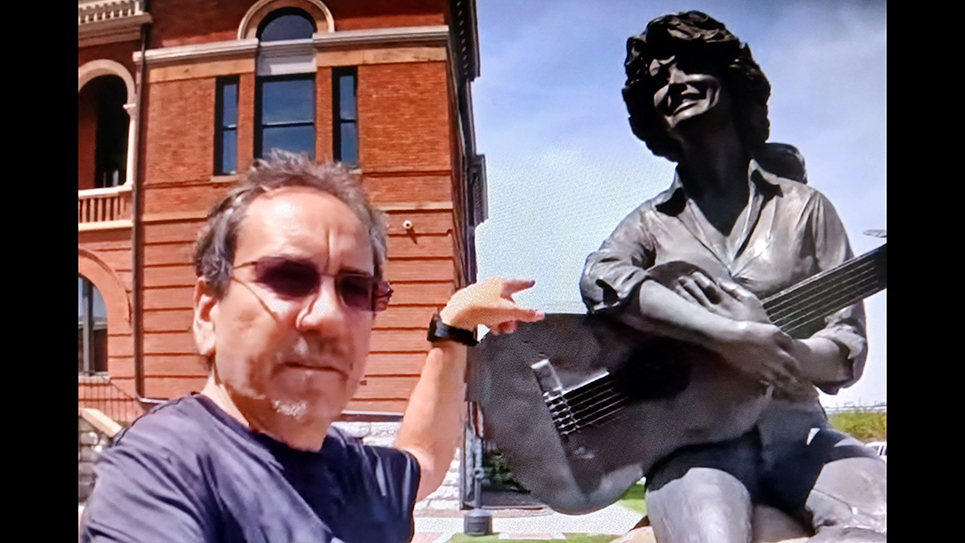All writers think their words should be read, if not savored. Well that’s a bit too much, because I’ve been organizing my past Focus essays and I cringe at some of my past prose. Furthermore, I am repeatedly surprised, as I read my weekly essay aloud to my editress wife, Becky, to find omitted words, typos and problems with verb tense. Misplaced modifiers are also challenging for this science guy. Most have dreamed of taking a final exam despite never attending the course. My nightmare exam covers the “Harbrace Handbook of English.”
Because I’m the writer, my readers know more about me than I do about them. I write from the heart which I believe produces better prose than verbiage which comes from an assignment. Words do have limitations, and some are prohibited in our illiberal, politically correct society. Modern liberalism is not liberal (open to new ideas); it is political correctness on steroids. Ask Shania Twain, the Sinclair Broadcast Group or, dare I quote Kanye West, who describes such illiberalism as “mental slavery.” Plantations of the mind still exist in America.
Are we free to express ourselves? The First Amendment guarantees the right of the Fresno State professor to embarrass herself and her university by writing vile comments about Barbara Bush. However, there should be consequences for her reprehensible remarks, but it appears there will be none. We are not free to endanger others such as shouting “Fire!” in a movie theatre. When I was growing up I learned that “Sticks and stones can break my bones, but words can never hurt me.” This is apparently not the case for college snowflakes who are so intolerant of conservative perspectives that safe zones are required to protect their ears and delicate persona.
At the dawn of humanity, the spoken word extended communication beyond grunts and body language. Ancient societies were largely aural, with stories told around campfires and in community squares. In antiquity, professional recontours memorized vast texts and, for example, recited the “Iliad” to a largely illiterate populace. I noted last week that the written word originated in Mesopotamia, largely to record grain storage, and evolved into scrolls, books and newspapers. In the 20th century moving pictures and then television brought communication into a visual realm. Perhaps we are now moving toward a virtual reality.
I write because I want to rather than for a paycheck or to please, though the latter is a fundamental aspect of humans. We want to please ourselves and others and hopefully God. I write because the creative process brings me joy. And because I’m a teacher at heart, I have the urge to educate and share with others. However, I am struck by how the spoken word is so different from the written word – unless you’re reading a teleprompter.
I am re-reading “Mere Christianity,” the famous book by CS Lewis. I have read many other books by Lewis but, perhaps because “Mere Christianity” was compiled from his WWII radio programs, I find the prose circuitous and difficult. I’m not critical of Lewis because I speak differently than I write. And I am more than my prose.
Perhaps the same goes for our politicians. However, all I know is what Congressmen say or do, because they write very little. It’s hard to parse intent or principles from sound bites or speeches largely written by others and delivered mechanically. Trump’s tweets may be a closer approximation of his principles than speeches, and certainly more accurate than CNN’s redactions. Perhaps every politician should be required to pen a 1000 word essay of their philosophy as a prerequisite for office.
One of my Fergisms (axioms) is, “If you say something often enough you begin to believe it, and that may be dangerous.” And especially dangerous is a situation where you’re surrounded by yes-men who never challenge your assertions. I wonder if this is what happens when Mr. Smith Goes to Washington. It appears to me that the Beltway Boys consider themselves superior to the rest of us, and it is obvious they care more about politics than the people they are pledged to represent. An obvious example is the recent Senate Foreign Relations Committee posturing over the nomination of Mike Pompeo as Secretary of State – pathetic and emblematic of a broken system.
If you doubt my contention that the written word is different than the spoken word, try praying or reading a book aloud. I’ve noticed that ministers often assume a different persona when preaching or when asked to lead a public prayer. My wife is a natural thespian and reads aloud better than me, though I am educated! Perhaps I scan the verbiage, and I’m less attuned to specific words as demanded in a scripted play.
I’ve been a lot of isms. I was brought up in the Presbyterian Church, but like many youngsters with little wisdom, I wandered off to the “far country” of the Prodigal. Fortunately, I figured things out and returned to the faith, joining the Methodist church after being a Baptist for a while. You might say I was Calvinistically elected and sprinkled, lost then found, saved and dunked, and now I’m blessed!
Hymnity is very important in Methodism, which began in camp meetings. Theological messages are sometimes best presented in melodious songs. Musical skill is stored in a different area of the brain than speech, and people who have had strokes can be retrained to communicate through singing. Having participated in many denominations, I find Methodist hymns especially beautiful, and singing sacred words warms my soul.
I’m a lover of words and I’m a bibliophile. Like most moderns, I process visually better than aurally, and I’d rather read from a book than a computer screen. Admittedly, I’m bookish, but I’ll acknowledge there are many ways to find the Way, the Truth and the Life. For two millennia the Bible has been the great compendium of wisdom. Now, some worship science as the great arbiter of truth. However, an honest person will acknowledge that reason, experience and tradition serve to modify both scripture (the Wesleyan quadrilateral) and scientific consideration.
Again, I argue for both science and religious perspectives. Albert Einstein did as well when he observed, “Religion without science is blind, and science without religion is lame.” Pithy and poignant prose, professor.






